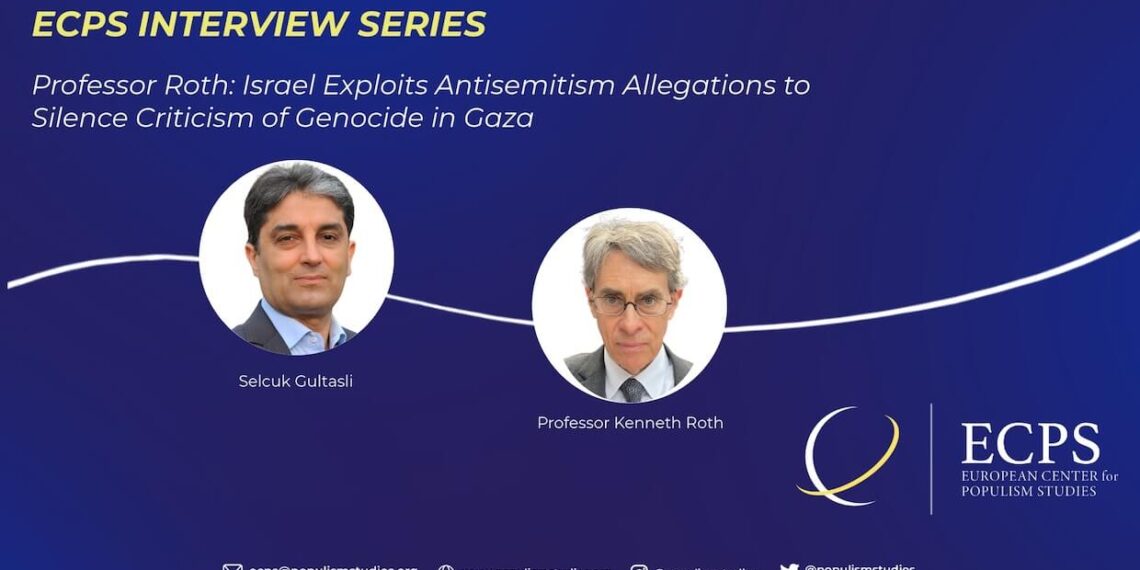In an exclusive ECPS interview, Professor Kenneth Roth—former Executive Director of Human Rights Watch and now at Princeton—warns that Israel is cynically using charges of antisemitism to shield what he calls genocide and mass atrocities in Gaza. “Netanyahu and his supporters are not defending Jews worldwide,” Professor Roth stresses. “They are sacrificing them—cheapening the very concept of antisemitism just when it is most needed.” Drawing on three decades of human rights leadership, Professor Roth situates Israel’s narrative strategy within a broader authoritarian playbook: populist leaders tilt elections, capture institutions, and scapegoat minorities while silencing dissent. His central warning is stark: criticism of Israel is not antisemitism, and blurring this line endangers both Palestinians and Jews worldwide.
Interview by Selcuk Gultasli
In this exclusive ECPS interview, Professor Kenneth Roth—longtime executive director of Human Rights Watch and now Charles and Marie Robertson Visiting Professor at the Princeton School for Public and International Affairs—warns that the Israeli government is cynically using allegations of antisemitism to silence criticism of what he describes as genocide and mass atrocities in Gaza. “Netanyahu and his supporters are not defending Jews worldwide,” Professor Roth stresses. “They are sacrificing them—cheapening the very concept of antisemitism just when it is most needed.” For him, conflating criticism of Israel with antisemitism not only shields state crimes but also undermines real protections against anti-Jewish hatred.
Professor Roth’s reflections build on more than three decades of global human rights advocacy. At Human Rights Watch, which he directed until August 2022, he oversaw the organization’s expansion into one of the world’s leading rights watchdogs, active in about 100 countries. Earlier, he worked as a federal prosecutor in New York and on the Iran-Contra investigation in Washington. From that vantage, he situates Israel’s narrative strategy within a wider pattern of populist-fueled authoritarianism. Today’s autocrats, Professor Roth argues, “still crave elections but tilt the playing field,”systematically undermining courts, capturing media, restricting NGOs, and intimidating universities. Democracy, he insists, cannot be reduced to ballots alone—it requires freedoms of expression, association, and the rule of law, all under attack.
Even amid authoritarian resurgence, Professor Roth emphasizes the power of coalitions of democratic, rights-respecting states. He recalls decisive breakthroughs such as the treaty banning landmines and the Rome Statute establishing the International Criminal Court (ICC)—both achieved despite superpower opposition. More recent successes, from UN oversight of the Saudi-led bombing campaign in Yemen to European-Turkish pressure curbing Russian strikes in Syria, show that principled middle-power alliances still matter. NGOs, too, must remain unwaveringly consistent: “Our work doesn’t distinguish between perceived friend and foe—we apply the same standards to everybody,” Professor Roth explains. That consistency, he argues, sustains credibility and strengthens the politics of shaming.
The interview traverses urgent contemporary debates: Trump’s embrace of authoritarian leaders, his sanctions on the ICC, and his “flood-the-zone” tactic of overwhelming institutions with constant shocks. Professor Roth dissects the dangers of scapegoating minorities, the misuse of Holocaust memory to excuse present atrocities, and the precedent of blurring law enforcement with war in extrajudicial killings. At every step, he insists that human rights must not be selectively applied or subordinated to cynical populist narratives.
Taken together, Professor Roth’s insights offer both a sobering indictment and a pragmatic roadmap: exposing the authoritarian logic that links populism, repression, and impunity, while affirming that principled coalitions and civil society can still defend rights. Above all, his warning is clear: criticism of Israel is not antisemitism—and protecting the integrity of that distinction is essential for Jews worldwide, Palestinians under siege, and the universality of human rights.


